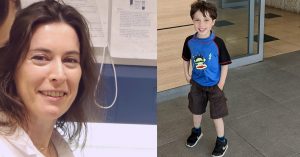In the News
Canadian child to participate in research for ultra-rare genetic disorder led by Dr. Shani Stern

Michelle Gauthier and Adam Freed from Ottawa visited Israel this past May to find help for their four-year-old son Maksim who has an ultra-rare disease — GRIN2B-related neurodevelopmental disorder. Diagnosed in January 2021, Maksim was accepted for a unique research study in Israel developing a cure for GRIN2B with the potential of identifying personalized drug treatments. “Added to the shock of the diagnosis,” says Michelle, “came the message that doctors know very little about the disorder and that we would be on our own to find answers and treatment. There were only100 cases worldwide at diagnosis.”
A single wrong letter on the gene, known as GRIN, from among 3.2 billion possible letters results in life-limiting consequences like intellectual disability, poor to no speech, low muscle tone and limited physical activity, and a high chance of developing debilitating seizures by puberty. Maksim’s variant is unique in the world, and he requires daily therapy and multiple weekly visits to doctors and therapists.
Finding treatment for Maksim is time sensitive. The sooner treatment begins, the better chance that the progression of the disease can be halted, and even reversed. The parents’ odyssey led them to scientists from the University of Haifa, Technion-Israel Institute of Technology, and clinicians from the Center for Rare Diseases in Emek Medical Center, who have combined their expertise and innovative approaches to expand knowledge of GRIN2B, identify personalized treatments and test cutting-edge gene therapy approaches to the disease.
The University of Haifa’s Dr. Shani Stern is a world leader in creating disease models for neurologic diseases based on patients’ cells, and the Head of the Precision Disease Modelling Laboratory in the Sagol Department of Neurobiology. Leading and innovative technologies in the Stern lab applied to GRIN2B cellular models, such as an AI algorithm that extracts biomarkers from patient’s blood, can be used to find the best drug treatment for patients like Maksim.
The family could not have contemplated this research without a fundraising campaign by friends and family to offset travel and medical costs and the support of Canadian Friends of Haifa University to deliver the funds directly to the research.
“Research on GRIN2B and GRIN disorders is desperately needed, and we are so grateful to the Israeli institutions that have come together to make this research possible. We hope that more researchers will enter this field so that additional work can be done to help Maksim and others,” says Adam. And he adds, “We are humbled and extremely grateful for the support from friends, family and even perfect strangers who simply want to help.”
For those interested in donating to the research, please visit Canadian Friends of Haifa University or the GRIN Disorders Research Foundation. One hundred percent of the donation is allocated to the research.
For more information about GRIN disorders visit https://curegrin.org/, and http://grin2b.com/.
*(l-r) Dr. Shani Stern (Sagol Department of Neurobiology) and Maksim Gauthier
For interviews:
Michelle Gauthier | 1-613-614-1200 | gauthiermi1@yahoo.com
